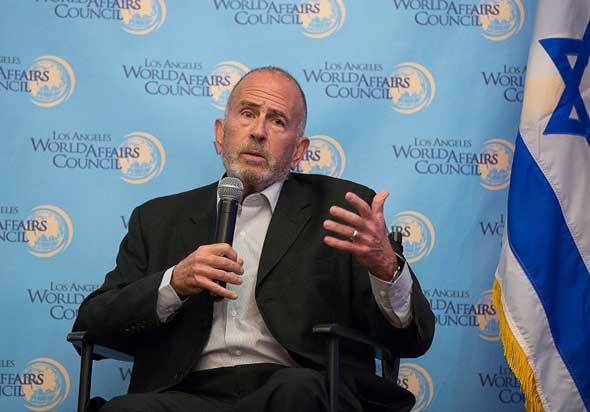
Yossie Alpher
The peace movement in Israel is shrinking towards irrelevance, said Yossi Alpher, a former Israeli military intelligence officer and Mossad operative, who delivered a candid and grim assessment of the Israel-Palestine conflict at a Los Angeles World Affairs Council dinner on Thursday, June 23. "It's shrinking because those who call themselves the peace movement continue to declare that a two-state solution is within reach... which flies in the face of the events that have emboldened Israeli public opinion in the past 10 or 20 years." Alpher was special adviser to Israeli Prime Minister Ehud Barak at the 2000 Camp David talks.
Alpher's contention, as he outlines in his new book No End to Conflict: Rethinking Israel-Palestine is that there is no near-term prospect of a peaceful resolution. "We've positioned ourselves on a slippery slope towards some sort of one-state reality." This slide began when Palestinian leader Mahmoud Abbas turned down Israeli Prime Minister Ehud Olmert's offer underpinning a two-state solution in 2008, said Alpher. "Abu Mazen [Abbas] hasn't wanted to negotiate since."
In Israel, Alpher said, even though polls consistently show a two-thirds majority are in favor of a two-state solution, by the same numbers Israelis vote in Knesset members who don't want a two-state solution and support continued settlement construction on the West Bank - because they say there is no reliable partner on the Palestinian side with whom to make a deal. "There are no conditions to make this happen," said Alpher. "This is why we are where we are."
Looking forward Alpher says the most likely scenario is a gradual slide towards an apartheid state where Palestinians don't have their own political representation, and Israel becomes more isolated internationally, violence continues, there is an exodus of talent from the country, and the American Jewish diaspora is split in its support for Israeli policies.
In addition to both sides contributing to the impasse, Alpher said the international community isn't helping. "All the well-meaning people on the international scene who would like to help us reach an agreement," Alpher said, "continue to make the same mistakes and, certainly in recent years, tend to make things worse, not better."
When asked about Israeli Prime Minister Netanyahu's views on the conflict, Alpher surmised that he would like to hold on to as much territory in the West Bank as possible with as few Palestinians as possible. "His vision of a Palestinian state would be an enclave of 40% of the West Bank," said Alpher. He described Netanyahu as a "very talented political manipulator" and credited him with keeping Israel out of trouble with the Arab Spring, and also for managing the economy well. But on the Palestinian issue he is leading Israel down a blind alley.
Ironically Israel is currently enjoying an unprecedented period of peace on the strategic level - "there isn't a single Arab state that is threatening us at the moment...Not only do Egypt and Jordan have peace agreements with us, but there are behind-the-scenes talks with the Saudis and the Emirates," said Alpher. "All because they and we share the threat perception that the real threats to our security are Iran, Hezbollah, Assad, Shia Islamic extremists, ISIS." These are threats to Arab security and threats to Israeli security - and they "mandate that we cooperate."
The bad news according to Alpher is that there is "one existential threat" and it is inside Israel - the domestic political impasse that is leading Israel into some sort of "very conflicted, ugly, tribalized" one-state reality with the Palestinians in the West Bank and East Jerusalem. "It's not a military physical threat, it's a threat to the essence of Israel as a Jewish Zionist democratic state."
Is there hope for change? Alpher said "what I can guarantee you is we will be visited by major strategic surprises in the Middle East and they will have a profound effect on the course of events." He said that "if you want hope, recognize that there are going to be such surprises and be ready to grasp them....and work to get us off the slippery slope."

Q&A with Yossie Alpher
When asked about comparisons with the Northern Ireland peace process, Alpher said that while some Israeli-Palestinian negotiators have traveled to Ireland to see what it's like, the differences are too great. "There's a far greater gap between Jews and Arabs than Irish Protestants and Irish Catholics." He also said Ireland isn't surrounded by enemies or hostile countries like Israel in the Middle East. "There are far broader spheres of conflict past the potential of Israel that have to be factored in," Alpher said. Also, Palestinians have had no experience of ever running a state. "There was no sense of a Palestinian nation until the past 100 years."
Alpher also debunked the idea that increasing economic well-being among Palestinians would automatically bring peace. RAND Corporation recently demonstrated in their Costs of the Israeli-Palestinian Conflict study that a two-state solution would be enormously economically beneficial to both sides. But Alpher said the attempts by Tony Blair and other political leaders to increase investment to the West Bank to promote peace haven't worked because "this is not an economic conflict." Alpher said the issues are "not affected by economic deprivation - it's an ideological conflict, it's political... it's increasingly religious on both sides and tribal... Every intifada has broken out in times of Palestinian prosperity."
In the end, Alpher argues, there are "more negotiable issues" and "less negotiable issues." The more negotiable issues are the ones created by the occupation in 1967: where's the border, what are the security arrangements? The pre-1967 issues are what he calls "the narrative issues": access to the holy places like the Temple Mount, and the the right of return for Palestinian refugees dating back to 1948. Alpher said "zero progress" has been made in all the negotiations to date in resolving the narrative issues - some of which go back 3,000-3,500 years. "The conclusion should be to get those narrative issues off the table. You're not going to solve them," said Alpher."If the objective is to end the conflict and end all claims, you can't. You should have learned that by now."
